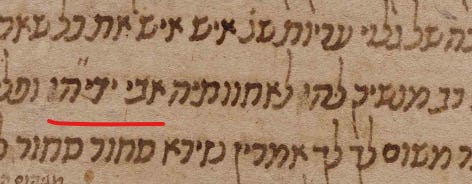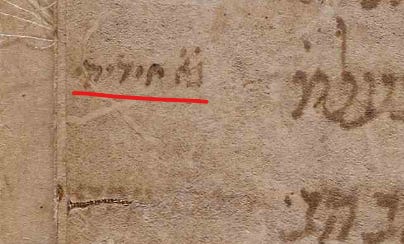Ulla kisses their hands
The other day, Avodah Zarah 17a, we heard about Ulla’s practice:
עוּלָּא כִּי הֲוָה אָתֵי מִבֵּי רַב, הֲוָה מְנַשֵּׁק לְהוּ לַאֲחָתֵיהּ אַבֵּי יְדַיְיהוּ, וְאָמְרִי לַהּ: אַבֵּי חָדַיְיהוּ. וּפְלִיגָא דִּידֵיהּ אַדִּידֵיהּ, דְּאָמַר עוּלָּא: קְרִיבָה בְּעָלְמָא אָסוּר, מִשּׁוּם ״לָךְ לָךְ, אָמְרִין נְזִירָא; סְחוֹר סְחוֹר, לְכַרְמָא לָא תִּקְרַב״.
The Gemara relates: When Ulla would come from the study hall, he would kiss his sisters on their hands. And some say: On their chests. And the Gemara points out that this action of his disagrees with another ruling that Ulla himself issued, as Ulla says: Mere intimacy with a woman with whom one is prohibited from engaging in sexual intercourse is prohibited, due to the maxim: Go, go, we say to a nazirite, go around, go around but do not come near to the vineyard. Just as a nazirite is warned not even to come into close proximity of a vineyard lest he consume a product of the vine, so too one is obligated to distance himself from anyone with whom intercourse is forbidden.
This seems like a strange confusion, and a strange practice. I understand kissing on the hands, as that is seen in certain cultures as courteous. On their chests seems kind of weird and inappropriate. And, does it really feel like קְרִיבָה בְּעָלְמָא in which he is acting?
(A tangent: the Hebrew word for chest is חזה. It has a dalet in Aramaic because there are three consonant sounds, /d/, /z/ and /dh/, while the Assyrian alphabet only has letters for two of them. The first two sounds map to daled and zayin letters in both Aramaic and Hebrew. However, the intermediate /dh/ sound, like the “th” in the word “either”, maps to a zayin in Hebrew and a daled in Aramaic. Other words like this are זהב and זכר.)
I would say that this variation is a textual and orthographic error, rather than an oral error, in whichever direction the error is. I would also say that the correct text is “their hands”.
The printings (Vilna, Venice, Pesaro) give both variants, as above.
As for manuscripts, Paris 1337 has just the hands:
but note that a close proximity of the final yud of אבי and the initial yud of ידייהו might (?) be confused as forming a chet, in some other manuscript. And also note that in arguing for an internal Ulla inconsistency, they write the similar דִּידֵיהּ אַדִּידֵיהּ, where again, perhaps something could form a chet.
Munich 95 has both but with chests listed first:
Look, though, as how the yud adjoined the the following dalet, and how that might approximate a chet.
Finally, we have a manuscript that lists both, but with “their hands” as the central and thus primary text. JTS 15 has:
and then, in a tiny marginal note, notes an alternative version with “their chests”.
This variation thus arose after the Talmud was written down and copied by scribes. Variants arose, and the (correct IMHO) text with ידייהו was supplemented in the margins by noting the iffy variant. Then, another scribe copied it into the central text and designated it with a ג”א.
There’s a parallel in Shabbat 13a, where the manuscripts are slightly more mixed:
Let us just also note that kissing on the hands, as an expression of gratitude, is indeed something that exists in Persian culture. The term in English is Proskynesis. It is also a custom into the present day in Sefardic circles.
Rabbi Akiva mentions this as a foreign custom of the Medes, in Berachot 8b:
תַּנְיָא, אָמַר רַבִּי עֲקִיבָא: בִּשְׁלֹשָׁה דְבָרִים אוֹהֵב אֲנִי אֶת הַמָּדִיִּים, כְּשֶׁחוֹתְכִין אֶת הַבָּשָׂר — אֵין חוֹתְכִין אֶלָּא עַל גַּבֵּי הַשּׁוּלְחָן, כְּשֶׁנּוֹשְׁקִין — אֵין נוֹשְׁקִין אֶלָּא עַל גַּב הַיָּד, וּכְשֶׁיּוֹעֲצִין — אֵין יוֹעֲצִין אֶלָּא בַּשָּׂדֶה.
The Gemara cites a statement from a baraita, along the lines of Rava’s advice to refrain from cutting meat on one’s hands: Rabbi Akiva said: In three aspects of their conduct, I like the Medes, and we should learn from their practices. When they cut meat, they cut it only on the table and not on their hands; when they kiss, either as a show of affection or honor, they kiss only the back of the hand and do not give the person being kissed an unpleasant feeling; and when they hold counsel, they only hold counsel in the field so others will not hear their secrets.
But more central to Persia, here is a bunch of people kissed the wicked Khomeini’s hand:









